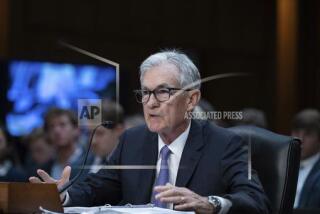Economy Hits ‘Soft Patch’
- Share via
WASHINGTON — Federal Reserve Chairman Alan Greenspan said Wednesday that continuing corporate scandals and worries about war with Iraq have dimmed business prospects and caused the economy to hit a “soft patch.”
Although Greenspan predicted that the economy will recover from its troubles without sinking further, the Fed chairman appeared more cautious than usual in his forecast, and suggested that further interest rate and tax cuts may be needed.
“Our best judgment is that we’re going through a soft patch,” but are not headed for a “far more significant weakening,” Greenspan told the congressional Joint Economic Committee.
The Fed chairman’s testimony came one week after the central bank unexpectedly slashed its signal-sending, federal funds interest rate -- already at a four-decade low -- a half-point to 1.25%. Wednesday’s remarks largely were aimed at assuring the public that the latest rate cut does not leave the central bank defenseless in the event of further problems.
But Greenspan’s comments may have been most notable for entertaining economic possibilities that until recently were considered remote. For example, Greenspan said central bank policymakers are looking for signs the U.S. is slipping into a Japan-style deflation, or downward spiral of prices, even though they believe the chances are slim. “Our conclusion is that we are not close to a deflationary cliff,” he said.
Greenspan said that if the country were to suffer deflation the Fed could do more than use its traditional technique of cutting the funds rates, the interest banks charge each other for short-term loans. It could flood the economy with credit by snapping up bonds with long terms or maturities. Such a move would attack deflation by effectively inducing its opposite, inflation or a general rise in prices.
“If it ever got to the point ... where we could no longer lower the target federal funds rate we could nevertheless increase the liquidity of the [economic] system by moving out on the maturity schedule,” Greenspan said. “As a consequence, there is virtually no meaningful limit to what we could inject into the system.”
But at least one former Fed official said the central bank would be venturing into unknown terrain if it used up its traditional interest rate tools.
“One should think of getting to zero [on the fed funds rate] as a big problem,” said former Fed governor Janet Yellen, now at UC Berkeley. “Once we get to zero, we’re in a world of very unconventional and untried methods.”
Greenspan acknowledged that he was perplexed about the economy’s current problems at least in part because the economic fundamentals seem so sound. “The economy ... is not significantly out of balance,” he told lawmakers. “We do not have excess inventories. We do not have, as best we can judge, a debilitating large overhang of capital stock.”
Instead, Greenspan said, the country is still suffering from the stock bust, “the fallout from corporate governance malfeasance problems and ... the geopolitical risks surrounding the negotiations with Iraq.”
More to Read
Get the L.A. Times Politics newsletter
Deeply reported insights into legislation, politics and policy from Sacramento, Washington and beyond. In your inbox three times per week.
You may occasionally receive promotional content from the Los Angeles Times.









